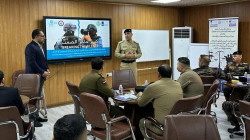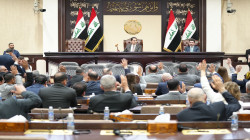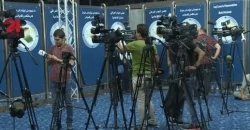On its 153rd anniversary.. Fourth authority celebrates its day amid "persistent violations"

Shafaq News / On June 15, the Iraqi journalists celebrate the national press day, which coincides with the publication of the first Iraqi newspaper, al-Zawraa’, in 1869.
Despite the well-established role of the fourth authority in the modern community, violations of journalist safety -with incidents including physical, verbal, online, and legal attacks- continue to undermine the ability of public service media to cover major news events with serious implications for Iraqi democracy.
Continuous violations..
"Iraqi Press Day is a reminder of all the violations the journalists have to deal with, including their suffering under the reign of ISIS," Hadi Jalu Maree, the head of the Iraqi Observatory for Press Freedoms, told the Shafaq News Agency.
"Official bodies and local authorities affiliated with state institutions have repeatedly filed lawsuits against journalists in a flagrant violation of the freedom of expression," Maree added, "Iraqi journalists are constantly threatened because of the views they express."
"The Iraqi Journalists' Syndicate had worked relentlessly to reduce those violations, with 75% of the press community being subjected to ongoing violations, in addition to lawsuits that have amounted to 20 cases this year," Maree said, "the press family in Baghdad is the most vulnerable to those violations, followed by the southern governorates, and the Central Euphrates."
"In terms of freedom and security, journalists shall enjoy real legal and security protection and be offered the means of a decent life," said Faten al-Halfi, a former member of the Office of the High Commissioner for Human Rights.
Saad Mansour, a journalist from Nineveh, revealed the gravest difficulties facing his partners, saying, "Most of the time, it is extremely difficult to obtain information even if it is guaranteed by the constitution, as it remains subject to security approvals that may prevent the completion of the article or digging into details."
"They live with constant fear as they must get what they need without being seen by a security or army member, which can sometimes hinder them from completing their work."
Women in press: achievements coupled with suffering
Despite their long history and obvious contributions, women journalists are subjected to threats and attacks in the course of their work just for being journalists.
According to Baraa Al-Musawi, a Najaf-based journalist, "the intolerance towards working women in society, particularly on television, is used as a justification for verbal violence, which can sometimes lead to physical violence. A bystander once yanked the microphone from my hands, claiming that women are not allowed to appear on television."
Iraq remains one of the most dangerous countries for journalists, with hundreds of journalists killed in the field over the last decade.
Resolution 59 of the United Nations General Assembly, adopted in 1946, states that" freedom of information is a fundamental human right". In addition, the Global Declaration of Human Rights of 1948 affirms freedom of opinion and expression, as well as the right to the media and the press, as stated in article 19, "every person has the right to enjoy the freedom of opinion and expression, including the freedom to hold opinions without harassment, and the freedom to seek, receive, and transmit news and ideas to others by any means and without regard to geographical boundaries."



